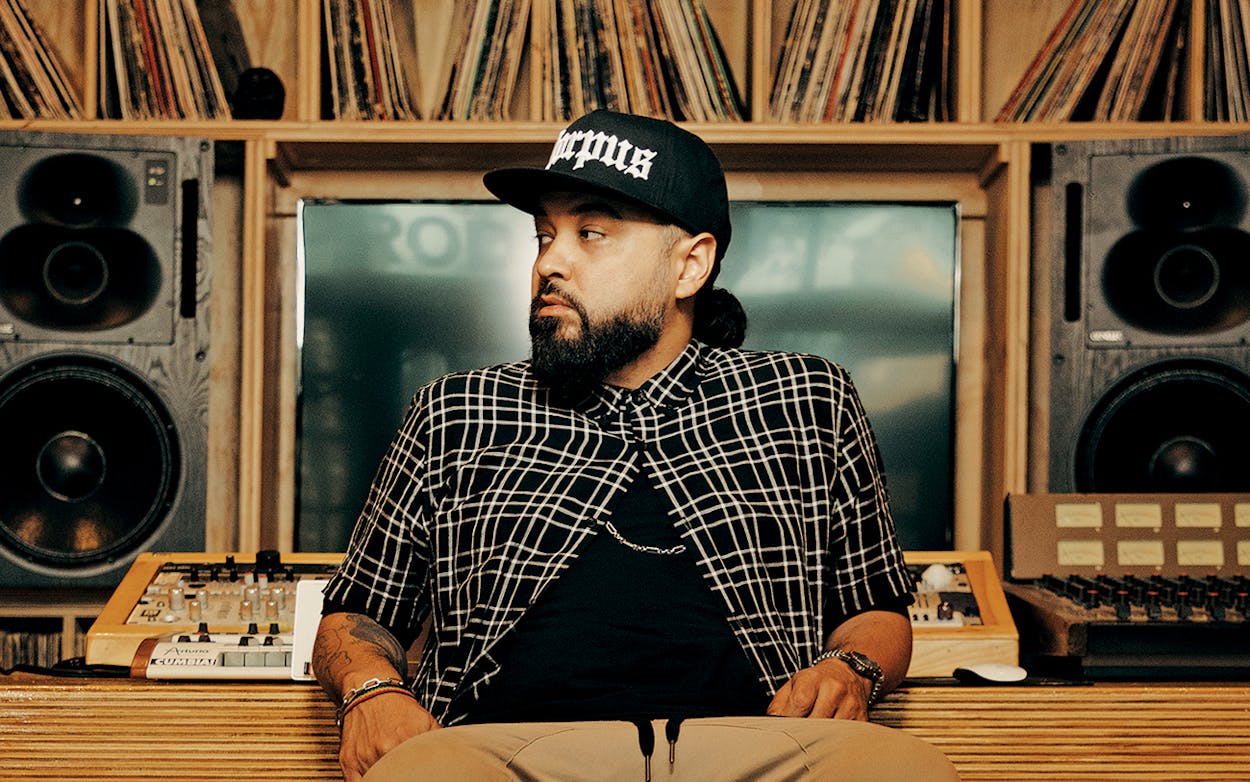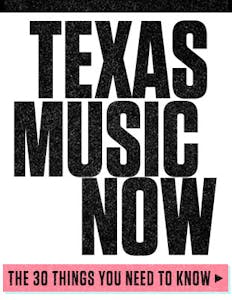This article is part of our November 2017 issue, which features a comprehensive look at Texas music.
On a Saturday afternoon in April, the DJ and producer El Dusty stood in the middle of the floor of the House of Rock, in Corpus Christi, holding his Chihuahua, Sasha, as he politely guided half a dozen men and women through preparations for a dance party. Walking toward the stage, where two men were raising some scaffolding, he presented two large flags that he wanted draped from the upper bars, flanking the table that would hold his turntables. The official city flag should hang stage right, Dusty said, while a black “Made in Corpus” flag, which has come to represent Dusty and his crew, should hang stage left from a post, where he could grab it easily. “I might want to wave it around and get crunk with the crowd,” he explained.
Quiet and unassuming, 37-year-old Horacio “El Dusty” Oliveira has recently become one of the more popular producers and DJs in the country. He’s also the unofficial mayor of the Corpus Christi music scene, such as it is. Last year, as part of a collective of friends called Locos Only, he bought one of downtown’s many abandoned buildings—on Peoples Street, just up the block from the House of Rock—which they’d been running as a kind of hipster mixed-use music and art center for several years. The group’s headquarters is called Produce (pronounced like the verb): a store, gallery, and studio where he and his three partners make stuff, from songs, videos, and paintings to shirts, caps, and the “Made in Corpus” flag. Next door is a space Dusty has converted into a recording studio, and adjacent to that is a room that he’s turning into a wine bar and art gallery.
Above it all, in a second-story home studio, he has been digitally transforming old-school cumbias, taking classic riffs and choruses and adding a big bass and hard electronic beats. Dusty is one of the leaders of a modern-day movement to create what some call cumbia electronica, nu cumbia, tropical bass, or Latin EDM. His most famous composition, a reworking of a classic sixties cumbia hit called “Bailando Cumbia,” is “Cumbia Anthem,” for which he earned a Latin Grammy nomination last year—an acknowledgement that gave him a special thrill because he was representing his hometown, which hasn’t made much musical news since Selena’s passing, in 1995. “But Corpus has plenty of potential,” he says. “It’s coming back. People are staying here. My roots are here. I can grow with this place, can own something, which is hard to do in a big city.”
Around 8 p.m., fans of all sorts began filing in for a bimonthly party that Dusty calls Tropicoso. They were mostly Latino millennials and thirtysomethings sporting T-shirts, button-downs, and party dresses. His wife, Cecy, a Monterrey-raised musician, stood behind the merch table, which was stacked with Locos Only–brand T-shirts and towels alongside black “Corpus” ball caps, one of Produce’s best-selling items. Dusty walked through the room talking to friends, his hair stuffed into a black beanie that functions as a hairnet, his arms covered in tattoos, including, on his right forearm, the words “Smile Now, Cry Later,” the title of a 1966 song by Chicano rock and roll pioneers Sunny & the Sunliners. Dusty lit a stick of palo santo wood, and the air slowly filled with the smoke’s sweet, sagelike fragrance. “It’s supposed to bring positive energy and ward off bad vibes,” he said, blowing on the glowing coal.
The party atmosphere was heightened by women in short black skirts who moved through the crowd offering free drinks from trays (Dusty had recently inked a sponsorship deal with Chivas Regal) and, in the back of the room, a spirited game of Lovers’ Loteria, led by a local painter and friend of Dusty’s named La Lisa Hernandez. Lovers’ Loteria, invented by Hernandez, is a form of bingo featuring cards illustrated with skeletons engaged in sex acts. Hernandez walked through four tables of contestants, calling out the names of the loteria scenarios as the players put bottle caps on their cards. “El motel!” “El condom!” “El threesome!” “El 69!”
“Bingo!” called a lucky player.
There were other artists on the bill—Gio Chamba, from Houston, and Happy Colors, the Dominican rapper—but people came to see and hear Dusty. By the time he took the stage, at 11:30, the club was packed. He stood over his computer and turntables in front of a video screen that played clips of skeletons dancing and low-riders cruising. Through the dry-ice smoke, Dusty, in his headgear, looked like a Sikh working the controls, scratching on the turntables and blending together songs he’d remixed. Groups of dancers did the washing machine dance, made famous by Selena, swaying their hips and butts and slowly turning in a circle. Occasionally, Dusty grabbed the mic and exhorted the dancers. “Cumbia!” he cried. “Cumbia!”
As the show continued past midnight, Dusty launched into the Ramón Ayala classic “Rinconcito en el Cielo,” a song with an accordion riff that members of the crowd recognized immediately. They sang along on the chorus, a melody that anyone growing up in Corpus had heard hundreds of times. But this version was a remix by some friends of Dusty’s, a DJ group called 2DLQTZ, and as Dusty danced back and forth onstage, Ayala’s forty-year-old vocals began ascending in a modern-day digital liftoff, climbing higher and higher over relentless electronic drums, and as the old gave way to the new, the crowd screamed and raised their hands in the air. Dusty nodded his head up and down and cued the next song.
Listen to El Dusty’s “Cumbia Anthem”:
- More About:
- Music
- Corpus Christi










